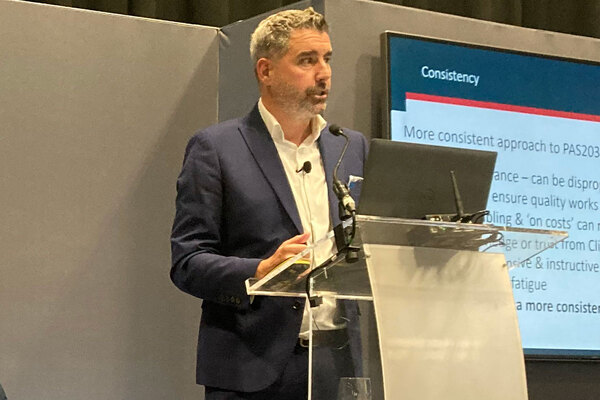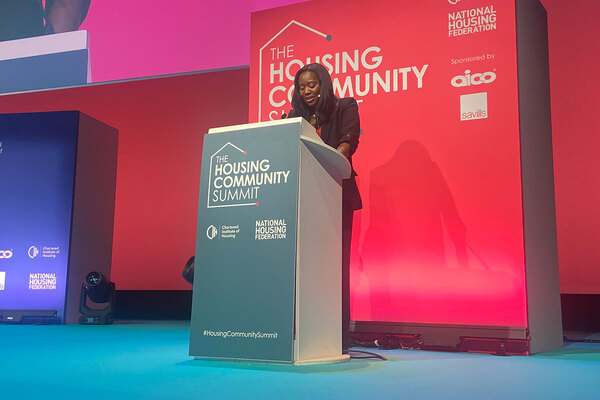You are viewing 1 of your 1 free articles
The Week in Housing: the home secretary has ‘lost it’
The Week in Housing is our weekly newsletter, rounding up the most important headlines for housing professionals. Sign up below to get it direct to your inbox every Friday

Good afternoon.
“Lost it” – this was how one cabinet minister described home secretary Suella Braverman this week after an article accusing the police of bias was considered an embarrassment to the prime minister.
What didn’t appear to embarrass Rishi Sunak was Ms Braverman’s earlier announcement to restrict the use of tents for people experiencing homelessness, after arguing that some people see it as a “lifestyle choice”.
The sector pushed back on the “punitive” plans, which would be unreasonable at any time, never mind during the largest quarterly increase in people forced to sleep rough in London since the pandemic.
I just cannot imagine considering an idea like this at the same time as asking taxpayers to pick up the tab for the cost of keeping my own house warm.
Inside Housing launched a new monthly media monitor this month, which you can read here if you missed it.
The monitor provides a rundown of what the media is saying about social housing. Last week, Peter Apps pointed out that some of The Telegraph’s reporting reveals a contradictory editorial line on housebuilding.
On the type of people who live in social housing, however, one of the newspaper’s regular columnists was in a particularly inflammatory mood. Under an article on Monday that reported how a former Hamas member had been given a council home, Allison Pearson asked: “Is there a council house in London NOT lived in by a Hamas leader?”
One of the more measured responses underneath the post on X (formerly Twitter) pointed out that “many racists are asking this question”. It did make me wonder if Ms Pearson and the home secretary would both need their own tents if landlords started allocating housing based on the extremity of a person’s political views.
Ms Braverman’s plans thankfully didn’t make it into the King’s Speech, which would have been a hard sell coming from a monarch wearing a crown. But he did almost announce the end of the “feudal” leasehold system.
The speech, written by ministers and delivered by King Charles on Tuesday, included commitments to leasehold and private rented sector reform, which were welcomed, but the sector urged the government to include support for new and existing social housing in the Autumn Statement.
Senior sector figures described the King’s Speech as “desperately disappointing” and a “missed opportunity” over the lack of commitment to new affordable homes.
At the same time, legal experts warned that while some of the changes in the leasehold bill are positive, there is a risk that the changes subject to consultation will never see the light of day.
Following the King’s Speech, the government launched a consultation on ground rent reform that includes capping the charge at a peppercorn rate for existing leaseholders.
The Autumn Statement is going to be an important one as we head into an election year.
Ahead of the chancellor’s statement, councils across London have added to calls for ministers to raise Local Housing Allowance (LHA) after new research suggested that tens of thousands more could become homeless if the rate remains frozen.
A total of 58,740 people – including 28,000 children – currently living in private rented accommodation will be homeless by 2030 if LHA is not increased, according to research for the cross-party group London Councils.
Sector sources have told me that we are likely to see a lot more of the type of strategic investment partnership that was announced by Sovereign Network Group (SNG) and house builder The Hill Group on Tuesday.
The landlord’s new coming-together with the house builder will be called Sovereign Hill Partnership (SHP) and will be focused on regenerating urban brownfield sites, in an equal 50:50 limited liability partnership.
SNG, which has plans to build 25,000 homes over the next 10 years and a long-term £8.6bn investment programme to met its net zero goals, said the collaboration will be “key to delivering on these ambitions” and is a “major step in bringing together the necessary capacity, capability and co-investment”.
Meanwhile, Vistry moved full steam ahead with its new focus on partnership working by signing an £819m deal with two Blackstone-backed providers that will see them acquire 2,915 homes.
Believed to be the biggest ever deal in the sector, Leaf Living and Sage Homes, which are both also backed by the Regis Group, put pen to paper on a deal to acquire the homes that are located on plots across 70 of Vistry’s developments.
In a sign of why more partnership working might be needed to tackle the housing crisis, L&Q revealed today that its capital expenditure is expected to fall by around 50% at the end of the financial year in March 2026.
The G15 member told the stock market that its capital expenditure is expected to peak in this financial year, as it focuses on its existing homes and looks to reduce risk across the business.
In another financial update, Legal & General’s (L&G) modular housing arm, which is currently being wound down, has reported annual losses of nearly £94m.
This comes after L&G announced in May that it was halting production at its factory near Leeds and reducing business operations, including making the majority of its 475 staff redundant. Newly filed accounts at Companies House said this process is now due to complete by June 2025.
On the regulatory side, a consultation opened this week that seeks the view of landlords on how the English regulator will use its new powers, which include the ability to issue failing landlords with unlimited fines.
In its quest to help landlords better understand how they can improve their own approach to tackling damp and mould, on Wednesday the Housing Ombudsman highlighted the good and bad practices of five landlords in dealing with the issue.
This advice was followed by a survey shared exclusively with Inside Housing which found that only 34% of social tenants are satisfied with their landlord’s complaint-handling, according to the first comprehensive research on tenant satisfaction measure (TSM) scores.
The research by data firm Housemark, midway through the first collection year, also found that nearly 40% of tenants do not believe their landlord listens to their views and acts on them. However, the vast majority of tenants are satisfied that their home is safe and well-maintained.
The data is the first comprehensive look at the mid-year results of TSMs in England.
From around the other devolved nations, the Scottish government published its Housing (Cladding Remediation) Bill. We picked out some key points here.
The Welsh government has launched a new £40m scheme that will offer interest-free loans to qualifying homeowners who are struggling to pay their mortgage.
In Northern Ireland, housing associations called for a “more strategic, government-led approach” after warning about their long-term ability to help residents with mental health and cost of living issues.
The release of the latest government figures earlier today really rammed home how unconscionable Ms Braverman’s controversial proposal to criminalise the use of tents by people sleeping rough really was.
No-fault eviction court proceedings have hit a seven-year high. Between July and September 2023, 8,399 English landlords started Section 21 court proceedings against their tenants, according to the latest data from the Ministry of Justice.
This is the highest number of accelerated procedure claims in a quarter since Q2 in 2016, when there were 9,330 claims.
Polly Neate, chief executive of Shelter, said: “It beggars belief that this government is prepared to use cynical tactics to delay the banning of no-fault evictions, while record numbers of renters are being removed from their homes without cause.”
On a more positive note, Martin Hilditch spoke to a 77,000-home housing association that has embraced co-creation. Southern Housing revealed the seven principles it is working to as it embeds this practice across the organisation.
Have a good weekend.
Stephen Delahunty, deputy news editor
Say hello: stephen.delahunty@insidehousing.co.uk
Editor’s picks: five stories you may have missed
Tenant stakeholder group more positive on consumer standards than any other, says RSH
London council issues record £480k fine to illegal HMO
Major house builder appoints new finance boss
Council aims to ‘create single version of truth’ with new housing management system
Large landlord says government must tackle gender bias in planning policy
Sign up for our Week in Housing newsletter
Already have an account? Click here to manage your newsletters










